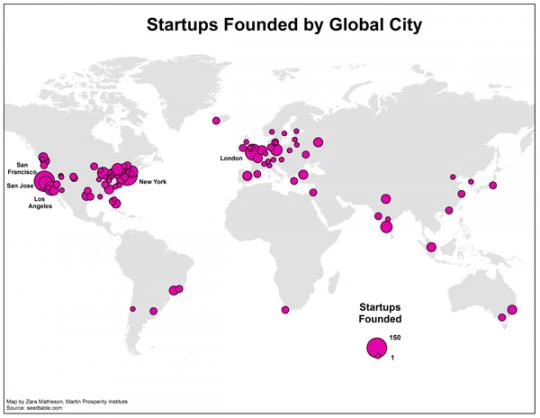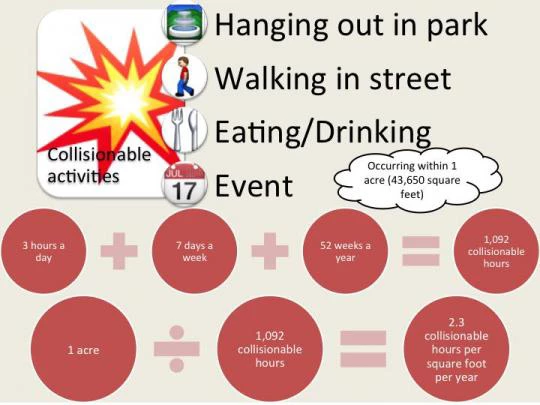
Cities are becoming the new ecosystems for innovation. Recent studies on venture capital (VC) investment in the United States reveal that innovation is moving from suburbs to downtown areas. Today, San Francisco hosts more VC investment than Silicon Valley and New York – a city where the innovation startup scene was merely anecdotic 10 years ago – has become the third-largest technology startup ecosystem in the United States, with more than US$2.4 billion VC investment in 2011.
This trend is not unique to the United States. Start-ups are surging in other major cities around the world, including London, Berlin, Madrid, Moscow, Istanbul, Tel Aviv, Cape Town, Mumbai, Buenos Aires and Rio de Janeiro, to name a few.
New technology trends have reduced the cost of technology innovation. Cloud computing, open software and hardware, social networks and global payment platforms have made it easier to create a startup with fewer physical resources and personnel. If in the 1990s, an entrepreneur needed US$2 million and months of work to develop a minimum viable prototype, today she would need less than US$50,000 and six weeks of work (in some cases, these costs can be as low as US$3,000). This trend is allowing entrepreneurs to take advantage of cities’ agglomeration effects: entrepreneurs “ want to live where the action is,” where other young people, social activities and peers and entrepreneurs are. They look for conventional startup support, such as mentor networks or role models, but also for nightlife, meet-ups, social activities and other potential for “collisions” – a combination best provided by cities.

This trend presents a great opportunity for developing countries. Today, more than 50 percent of the population already lives in cities, a percentage that approaches 80 percent in regions such as Latin America. Africa and Asia have the fastest urbanization rates in the world, particularly driven by poorer countries.
Developing countries can tap into this growing resource of human capital and talent to produce new innovation centers within their countries that produce growth, entrepreneurship and employability while addressing local problems. Technology and entrepreneurship skills have become easier to develop for unskilled and unemployed populations, especially youth. For instance, coding and open hardware skills that previously took years to learn can now be trained in weeks, increasing employability and entrepreneurship in these ecosystems. As a result, experience from cities such as in New York demonstrates that technology innovation ecosystems create job opportunities that address a variety of skill sets, with almost 50 percent of technology ecosystem-related jobs not requiring a bachelor’s or PhD degree.
This opportunity will become a priority for developing countries in order to adapt to the new trends in jobs prompted by rapid technology developments, such as digital manufacturing, robotics, data analytics, lighter materials, and others. Many think a so-called “ third industrial revolution” is underway, which may erode traditional manufacturing jobs and routine cognitive skills jobs. This will impact not only those countries that have most taken advantage of low-skilled labor for manufacturing, but also those others which depend on one main source of income, which may now be subject to greater volatility.
Fostering tech innovation ecosystems will provide skills for today’s new job landscape and the local innovation to create new companies and industries, while also addressing local problems from developing countries. Examples such as M-Pesa in Nairobi or Tarad in Bangkok show that innovation can successfully produce these results. However, the pace of innovation in developing countries will need to increase substantially in order to create the new job opportunities needed to adapt to these upcoming changes. Cities, as technology ecosystems and engines of innovation, will be at the center of these new potential transformations.
With this blog post, we are initiating a series of blogs where we will:
- Analyze the potential impact of the build-up of tech innovation ecosystems;
- Identify key success factors to develop tech innovation ecosystems in cities; and
- Explore case studies from successful ecosystems.
Our goal is for this framework to improve through its iterations in different cities and to be open-source for interested parties to use and improve it freely. We welcome your thoughts and ongoing discussion.


Join the Conversation